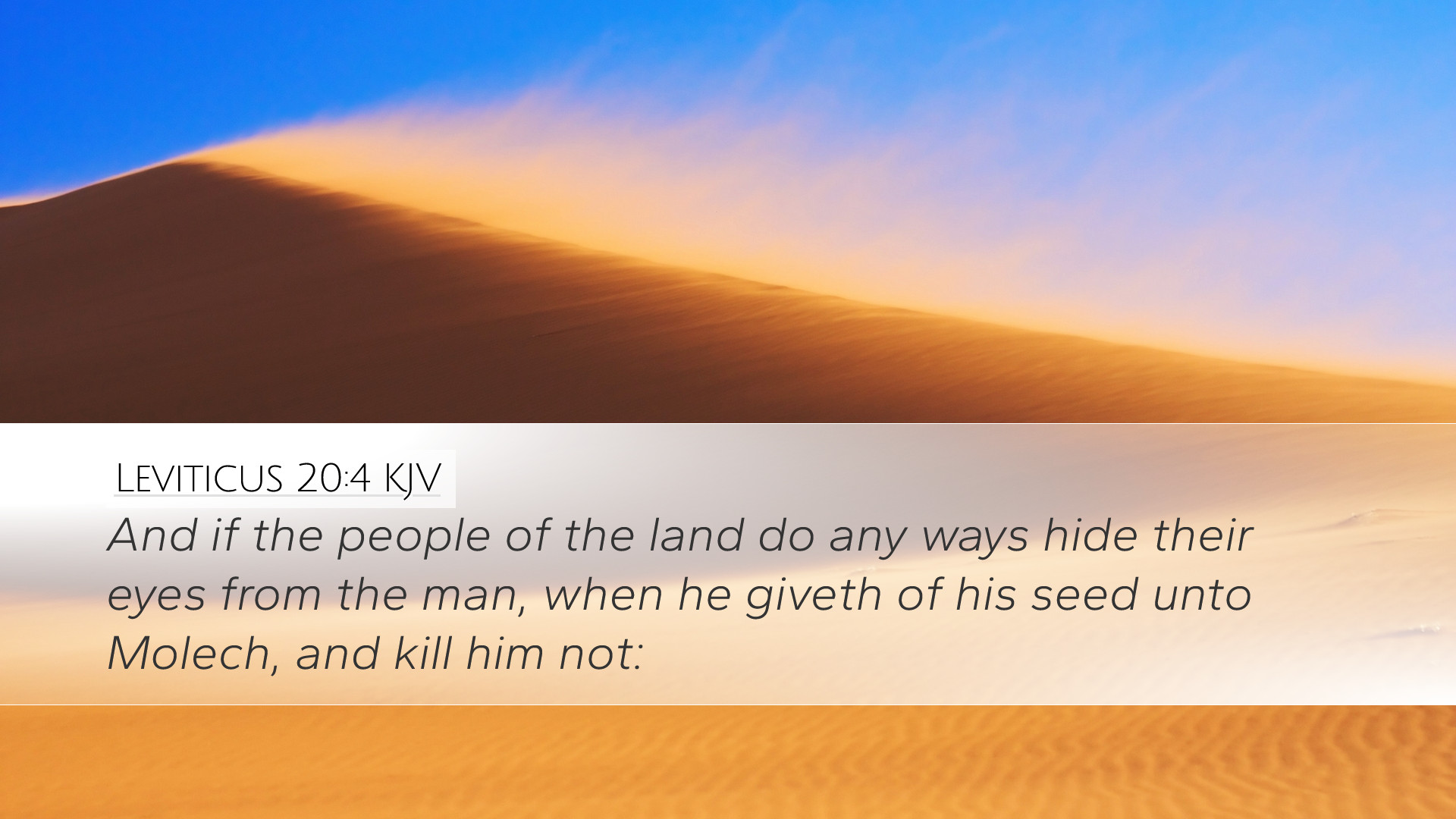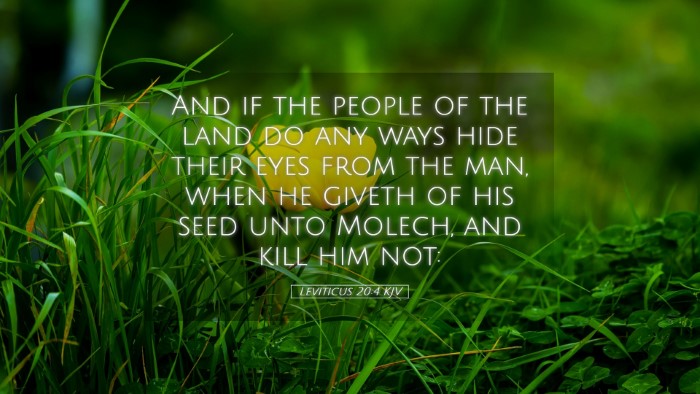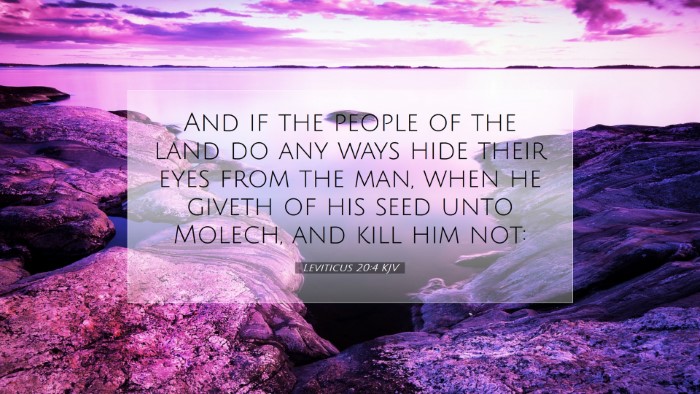Commentary on Leviticus 20:4
Leviticus 20:4 presents a serious mandate from God regarding the consequence of idolatry and the legal responsibilities of Israel regarding the worship of Molech. The verse states:
"And if the people of the land do any ways hide their eyes from the man, when he giveth of his seed unto Molech, and kill him not."
Contextual Overview
The chapter addresses various punishments for different sins, emphasizing the holiness of God and the need for His people to maintain moral and ceremonial purity. This particular verse centers on the grave sin of offering children to Molech, which was a practice among some of the neighboring pagan cultures.
Insights from Commentators
Matthew Henry's Commentary
Matthew Henry emphasizes the serious nature of idolatry, particularly the worship of Molech. He notes that this was not merely a physical act but a profound moral failing that could not be ignored by the community:
- Public Responsibility: Henry highlights the collective responsibility of the Israelite community. If someone witnessed a neighbor engaging in this heinous act and did not report it or intervene, it signified a collective denial of justice.
- Hidden Sins: He elaborates on the phrase "hide their eyes," suggesting that willful ignorance does not absolve one from moral culpability. The community must be vigilant against such abominations.
- Serve Justice: Henry concludes that it is essential for believers to actively oppose iniquity and seek justice on behalf of the vulnerable. Failing to act in accordance with God's commands reflects a serious spiritual failure.
Albert Barnes' Notes on the Bible
Albert Barnes provides a detailed analysis of the cultural significance of Molech and the implications of this verse:
- Cultural Context: Barnes connects the worship of Molech to the wider context of Canaanite fertility rites, where child sacrifice was seen as a means to appease deities for prosperity and fertility.
- Divine Judgement: The judgment prescribed for those who would turn a blind eye to such practices serves as a stark warning. Barnes notes that God's laws reflect His viewing these acts as fundamental breaches of covenant.
- Community Engagement: He cautions against passivity in the face of moral decline, urging leaders and laypeople alike to uphold God’s commands actively. The language in this verse calls for accountability within the community.
Adam Clarke's Commentary
Adam Clarke provides a nuanced interpretation of the verse, focusing on the legal aspects laid down in the Mosaic law:
- Legal Implications: Clarke emphasizes the importance of the law in protecting the innocent, especially children, against the idolatrous practices prevalent in the surrounding cultures.
- Role of Witnesses: He suggests that the requirement for witnesses to bring forth their knowledge of such practices ensures that justice is not just the responsibility of the officials but of every citizen. God’s justice is the reflection of His holy character.
- Spiritual Awakening: Clarke also argues that the neglect of such severe sins leads to a spiritual dullness within the community, resulting in divine judgment. He advocates for vigilant spiritual life to resist cultural encroachments.
Theological Implications
The theological implications of Leviticus 20:4 are profound for both ancient Israel and contemporary believers:
- Holiness of God: The verse reflects God's unwavering stance on holiness; He demands that His people abstain from all forms of wickedness, and in this case, the gruesome sacrifice of children.
- Social Justice: It reinforces the biblical principle that faith produces social justice. Those who have been redeemed are called to advocate for the rights of the weak and the innocent.
- Consequences of Sin: The grave ramifications outlined in this passage serve as a warning of what happens when God's people turn away from His commands. It calls believers to a lifestyle of obedience, reflecting their covenant relationship with Him.
Practical Applications
In light of these deep theological and practical insights, several applications emerge for today’s church:
- Vigilance in Community: Pastors and believers need to be vigilant regarding practices that erode the moral fabric of the community—as in ancient Israel, issues such as child sacrifice have modern parallels in things like abortion and child exploitation.
- Active Participation: The church must actively participate in advocating for social justice issues, standing against cultural norms that disregard human life and dignity.
- Education and Discipleship: There is a significant need for teaching sound doctrine and biblical ethics in churches to ensure members are equipped to discern right from wrong as secular ideologies gain ground.
Conclusion
Leviticus 20:4 serves not merely as a historical account of ancient Israel’s legal framework but as a living commentary on the nature of God, human responsibility, and societal ethics. As believers study this verse and the commentary surrounding it, they are reminded of the gravity of sin, the holiness of God, and the communal responsibility they bear as part of the body of Christ. May this understanding lead to a deeper commitment to justice, truth, and holiness in every aspect of life.


